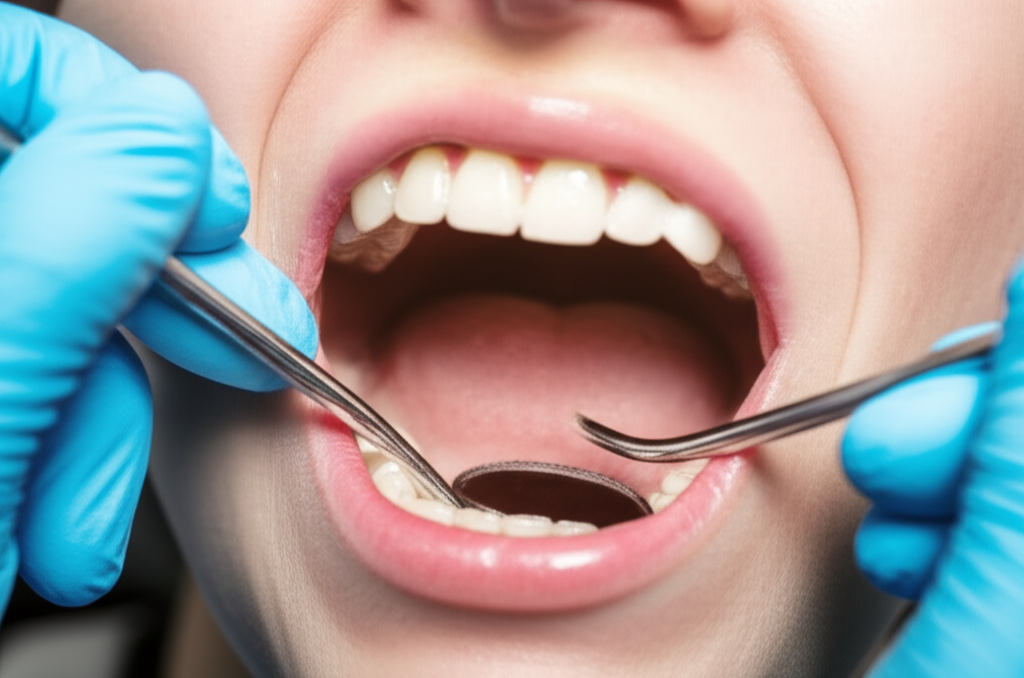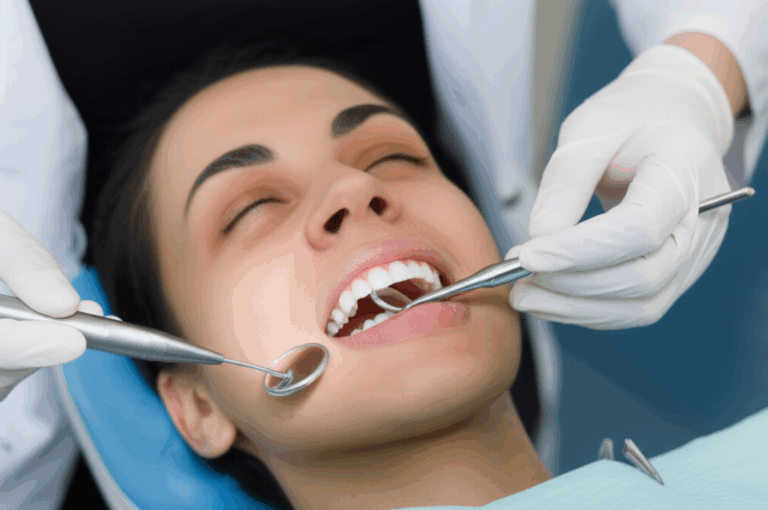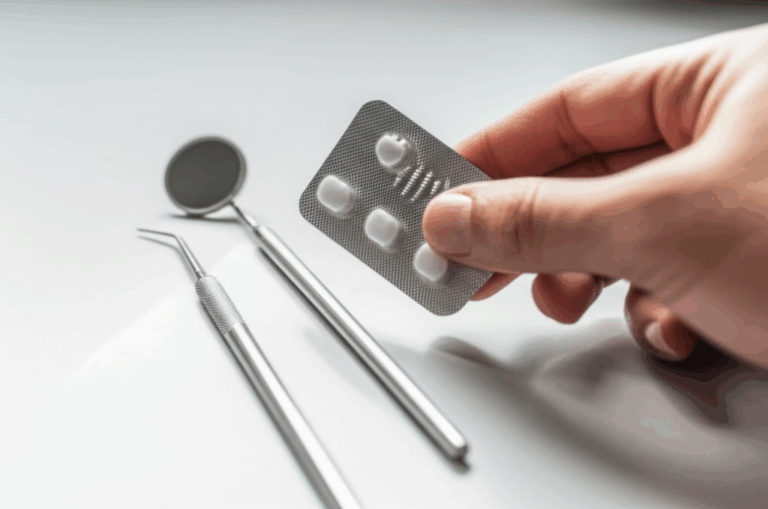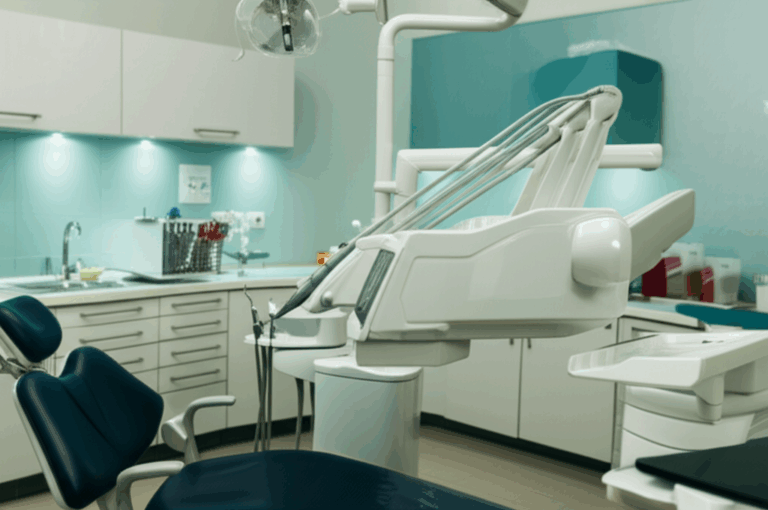
Can Your Dentist Detect Mouth Cancer?
Understanding Oral Cancer Screenings and Early Detection
That small sore spot on your tongue. The strange white patch on your gum. Maybe you’ve noticed a bump that just won’t go away. If you’ve ever stared in the mirror and wondered, “Can my dentist see if I have something serious, like mouth cancer?”—let’s clear things up right now. You’re not alone in thinking about this, and yes, your dentist can really help find oral cancer early. In fact, dentists are often the first health workers to spot something wrong.
Knowing that should give you some comfort, but that’s just the beginning. So, how does your dentist check for signs of cancer? What should you look for yourself? Who has a higher risk? Most importantly, what happens if your dentist sees something that doesn’t look right?
You’ve come to the right place. We’ll go over everything you should know—without using difficult words or trying to scare you. This guide will help you understand what your dentist checks, what you can notice at home, what happens if something looks worrying, and how you can take care of your mouth health.
What We’ll Cover
In This Article:
- The Dentist’s Important Role in Finding Mouth Cancer
- What Does a Dentist Check During a Mouth Cancer Screening?
- Common Signs and Symptoms of Mouth Cancer You Should Know
- Who Is at Risk for Mouth Cancer? Big Risk Factors
- What Happens If Your Dentist Finds Something Unusual?
- Why Regular Dental Visits Matter for Mouth Cancer
- Your Main Takeaways and Next Steps
The Dentist’s Important Role in Finding Mouth Cancer
Let’s answer the main question: can your dentist really spot mouth cancer? The answer is yes. Dentists are trained, alert, and ready to check for mouth (oral) cancer signs. Every time you go for a normal dental visit, you’re not just getting your teeth cleaned or gums checked—a dentist is also looking all around your mouth for anything that isn’t normal.
You might not even notice! Maybe your dentist talks with you while moving your tongue or checking your cheeks. What they’re really doing is looking for red flags like sores, lumps, or color changes.
Why does this matter? Because if mouth cancer is found early, your chances of getting better are much higher—up to 85%, according to five-year survival numbers for early-stage mouth cancer. Sadly, most mouth cancers aren’t found until much later, when they’re harder to treat and hope drops fast.
So, regular dental visits are for much more than just cleaning—they could save your life.
What Does a Dentist Check During a Mouth Cancer Screening?
So, what exactly is your dentist looking for? Most check-ups follow a simple process that works well.
1. Looking Around (Visual Check)
Your dentist will look at:
- Lips
- Inside and outside of cheeks
- Gums
- Tongue (both sides and under)
- Roof of your mouth
- Floor of your mouth
- Throat and back of your mouth
They’re checking for:
- Red or white patches: Color changes that won’t go away, even if they don’t hurt
- Sores that won’t heal: Spots that last more than two weeks should be checked again
- Lumps, thick spots, or rough areas: Anything that feels or looks different
Sometimes these changes are tiny—like finding a clue in a “Where’s Waldo?” picture. Dentists practice spotting these little changes early.
2. Feeling for Lumps or Swelling (Palpation)
Next, your dentist will gently press:
- Under your jaw
- Sides of your neck
- Around and under your tongue
Why? Swollen glands, pain, or lumps could point to a bigger problem just below the skin.
3. Special Tools (If Needed)
Some dentists use gadgets like:
- VELscope or Identafi: These hand-held lights help show different cells by lighting up “bad” areas
But these are just extra tools—not a replacement for a good check by your dentist.
Common Signs and Symptoms of Mouth Cancer You Should Know
A mouth sore doesn’t always mean cancer. But being aware is important, because the first signs of cancer can look like common mouth problems—only they don’t go away after some time.
Look out for:
- A sore or spot that won’t heal after two weeks
- Red or white patches that you can’t wipe off
- A lump, thick spot, or rough area inside your mouth
- Trouble or pain when chewing, swallowing, or talking
- Numbness in your tongue, lips, or mouth
- Changes in how your teeth fit or if your dentures start to not fit right
- Constant sore throat or feeling like something is stuck in your throat
- Voice changes or being hoarse a lot
- Bleeding in your mouth for no clear reason
- Sudden weight loss you can’t explain
- Bad breath that won’t go away, even with brushing
Not sure if something is wrong? Go get it checked. If you see or feel something new—and it sticks around for a few weeks—make a dentist visit. Fast action is key.
Who Is at Risk for Mouth Cancer? Big Risk Factors
You may think, “Why would I have this? Do I need to worry?” Mouth cancer can really happen to anyone—but some things make it more likely.
Main risk factors:
- Tobacco use: No matter if it’s smoking, chewing, cigars, or anything else—each kind pushes your risk way up.
- Heavy drinking: Mixing tobacco and alcohol makes things much worse (up to 30 times higher risk).
- Human Papillomavirus (HPV): Especially a type called HPV-16, which is linked to more mouth and throat cancers, even for younger, non-smoking people.
- Too much sun (especially for lips): Like your skin, too much sun on your lips—especially if you’re outside a lot—raises your risk.
- Getting older: Mouth cancer happens more in people past 40 (but younger adults can get it, too, especially with HPV).
- Weak immune system: Some sicknesses, medicine, or treatments can make your body weaker at fighting cancer.
- Bad nutrition: Eating few fruits and veggies or lots of junk food might add to your risk.
How to lower your risk: Not every risk can be changed, but quitting tobacco, drinking less, using lip balm with SPF, and eating healthy can help.
What Happens If Your Dentist Finds Something Unusual?
Here’s where people often get scared—but don’t panic. Most bumps or sores are not cancer, but your dentist wants to be safe.
Here’s what usually happens:
Why move fast? Because, like we said, if mouth cancer is found before it spreads, you have a much better chance—about 85% survival. Every week is important.
Why Regular Dental Visits Matter for Mouth Cancer
You brush twice a day. You use floss sometimes. Need the check-up, too? Yes, for more reasons than just white teeth.
Why you must keep seeing your dentist:
- Screenings are normal: Most dental check-ups include a quick mouth cancer check—even if you don’t notice.
- Find problems early: Dentists are trained to spot trouble before you feel anything wrong.
- Get personal advice: If you have higher risk (smoking, drinking, HPV, past cancers, and so on), your dentist might want to see you more often.
- For your whole health: Dentists check for more than cancer—they look out for gum sickness, infection, and other health problems, too.
How often should you go?
- General advice: At least once a year, even if your teeth seem fine.
- High risk: Twice a year or as your dentist recommends.
What You Can Do at Home vs. When to See a Dentist
Think of mouth cancer checks the way you check the sky for storms—you want to be ready, not scared.
What You Can Do at Home
1. Look at your mouth yourself: Once a month, look in the mirror. Feel along your cheeks, under your tongue, and around your gums. Watch for any new changes.
2. Pay attention: If you see red or white patches, lumps, or sores that don’t heal after two weeks, note when they showed up and what they look like.
3. Lower your risk:
- Don’t use tobacco
- Drink less alcohol
- Eat more fruits and veggies
- Use lip balm with SPF
- Ask your doctor about the HPV vaccine
When to See a Dentist
- If you find anything strange during your at-home check
- If you have a sore, patch, or lump that won’t heal in two weeks
- If you feel pain, numbness, or swelling you can’t explain
- If your teeth suddenly move, or your dentures fit wrong
Looking for custom dental work? Learn about how a digital dental lab can help with repairs and make sure you get the best care if something needs fixing.
Who Should Get Mouth Cancer Screenings? (Is This for Me?)
To be honest? Everyone should get checked for mouth cancer during regular dental visits, no matter your age or how healthy you feel. But some people need to be even more careful.
Best candidates:
- People who smoke or used to smoke
- Those who drink alcohol often
- Anyone over age 40
- If you had head or neck cancer before
- People with HPV
- If mouth cancer runs in your family
- People who are outdoors a lot and don’t use lip sunscreen
- Anyone who sees mouth changes, lumps, or sores that stay
If you have things like dentures or crowns or have had mouth surgery, you might want to see a dentist who works with a crown and bridge lab for the right care.
Who might need more checks sooner?
Anyone with a weak immune system or health problems should ask their dentist about getting checked more often.
How Good Are Dentists at Spotting Mouth Cancer?
Good question. The facts are pretty clear:
- Dentists are often the first to see warning spots.
- Going for regular checks could mean a small fix instead of a big surgery—or worse.
- If mouth cancer is found before it spreads, chances of getting healthy are up to 85%.
- Sadly, about 70% of mouth cancers are found late—mostly because people skip the dentist or wait too long.
So, what’s the point? Trust those regular dentist checks. They could save your life.
The Team That Helps If Cancer Is Found
Mouth cancer is a big deal. Your dentist won’t be working alone if something comes up.
Who helps:
- Dentist: Finds the problem first.
- Oral surgeon/mouth doctor: Finds out what it is and what to do next.
- Radiologist: Uses pictures like scans to see where it is.
- Oncologist: Treats cancer if needed.
- Therapists and helpers: Help you talk, eat, or fix your mouth if you had surgery.
Many times, if caught early, you only need a small surgery. If found late, treatment can be much harder and can change the way you look, talk, or eat.
Just remember: Even though it can sound scary, most mouth changes are not cancer, and the sooner you act, the better your chances of staying healthy.
More Than Cancer—Why Dental Care Matters for Your Whole Health
Yes, your dentist checks for mouth cancer, but that’s far from all they do.
A regular dental visit can:
- Show early signs of stuff like diabetes, anemia, or weak immune system
- Find vitamin shortages
- Catch gum disease, which is tied to heart problems
- Find cavities or cracked teeth early, before they hurt
Think of it this way—a healthy mouth helps you have a healthy body! If you ever need special dental repairs, you might want to look into a china dental lab for high quality, made-for-you dental work.
Your Main Takeaways and Next Steps
Let’s go over what matters most:
- Can your dentist find mouth cancer? Yes! They check for warning signs every time you go for a regular exam.
- Early is better. The sooner cancer is found, the easier it is to treat—and the higher your chances of getting well.
- Know your risks. Smoking, drinking, HPV, too much sun, bad eating, and age can all add up. Try to lower those risks when you can.
- Don’t ignore odd sores or bumps. If something is not healing or seems odd, see your dentist in two weeks.
- Keep your dental visits, always. Going once or twice a year isn’t just about clean teeth. It might save your life.
- Ask your dentist questions. Don’t be shy! Speak up about anything that seems off.
- Take control of your health. Small actions—like regular check-ups, quitting smoking, or eating well—have big benefits.
Frequently Asked Questions (FAQs)
Does every check-up include a cancer screening?
Most dentists do a quick mouth cancer check during your regular exam. Some are more careful than others. If you’re not sure, just ask: “Are you also checking for mouth cancer?”
Is mouth cancer screening painful?
No—the check is quick and doesn’t hurt. You might feel the dentist’s gloved hands pressing in your mouth or neck, but it should be fine.
What if my test comes back negative?
Good news! Your dentist may just want to watch the area at future visits.
Are there new tests I should know about?
Special lights or brushes can be used, but a careful look and feel is still the best way.
Where can I find more info?
The American Dental Association (ADA) and the Oral Cancer Foundation have great resources for people.
Take Action: Book Your Dental Check-Up Now
Think of your mouth as your body’s front door. Next time you’re at the dentist, remember—they’re not just cleaning your teeth; they’re looking after your health, too.
If you’re worried about a spot in your mouth or just haven’t had a check-up in a while, don’t wait. Call now and ask for a mouth cancer screening. It’s simple, painless, and can really save your life.
Your daily habits, regular care, and keeping informed matter most. Take the next step today. Your health—and your smile—are worth it.
Sources:
- American Dental Association (ADA)
- Oral Cancer Foundation
- National Cancer Institute
- World Health Organization (WHO)
(Data and advice are based on what is known now; for personal medical advice, always see a real dental professional.)
Find more about dental health and mouth care with our patient dental resources, or check out our practical guide for extra tips on keeping your mouth healthy.
If you have more questions or want advice just for you, feel free to ask your dentist at your next visit. You’ve got the knowledge—now put it to work!








